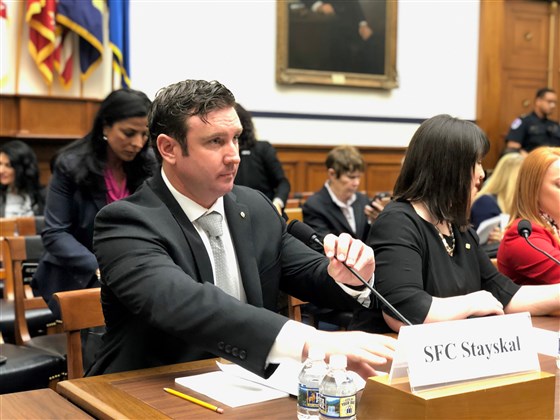
A Green Beret is Fighting to Change the Feres Doctrine
An old legal precedent that protects negligent medical professionals is being challenged by a 35-year-old Army Green Beret. Sgt. 1st Class Richard Stayskal underwent a CT scan of his lungs is challenging the Feres Doctrine after he says VA medical staff failed to note a mass in his right lung.
In 2004, Sgt. Stayskal was hit with a bullet in his chest during a tour of duty in Iraq. The injury left significant scar tissue. Thirteen years later, in January 2017, he reported to the Womack Army Medical Center in Fort Bragg. He had a scan, but no doctor noted the mass on his right lung. The tumor was more than an inch in diameter. Four months later, Stayskal was rushed to the ER by ambulance. He was having chest pains, wheezing and felt dizzy. This time, doctors noted an abnormality that needed attention but sent him home with a diagnosis of atypical pneumonia, three prescriptions and a referral to a military hospital pulmonologist for evaluation.
That summer, Sgt. Stayskal was coughing up blood. He obtained special permission to go off base to see a civilian specialist. It was with the civilian specialist that Stayskal received his first accurate diagnosis: Stage 3 Lung Cancer.
The lack of proper medical care meant that Stayskal went six months without a proper diagnosis. This allowed the cancer to grow rapidly to its advanced stage. From the first scan in January to his diagnosis, his tumor nearly doubled in size.
Stayskal’s cancer is now Stage 4 and terminal.
Unfortunately, this is the story of many of America’s veterans. Notably, if they received such negligent medical care in the civilian world, they would have some sort of recourse, such as filing a lawsuit against the negligent doctors. However, because of the Feres Doctrine, active-duty service members are not able to sue the federal government for medical malpractice.
What is the Feres Doctrine?
The Feres Doctrine is a legal doctrine that prevents people who are injured as a result of military service from successfully suing the federal government under the Federal Torts Claim Act. Feres v. the United States combined three pending federal cases and involved servicemen who picked up highly radioactive weapons fragments from a crashed airplane. The three service members were not able to recover damages from the government for their injuries.
The Feres Doctrine has survived several legal challenges since a 1950 Supreme Court ruling made it so the United States is not liable under the Federal Tort Claims Act for active-duty injuries. Cases are dismissed, some go on to appeal, but many are dissuaded from even filing because of the Feres Doctrine.
Often, the Supreme Court will decline to hear cases, considering this settled law.
While many understand the significance of preventing active-duty soldiers from being able to file a lawsuit for injuries on the battlefield, many people are unaware of their ability to sue for medical negligence in a stateside hospital.
Why is the Feres Doctrine defended?
The Department of Defense defends the current system of medical accountability. The department maintains that regardless of who is at fault, benefits are paid. In addition, the department says that every injury or death is treated the same.
If there is an exception carved out for medical claims, courts could award extra compensation for certain injuries or deaths. However, cases involving combat injuries would not be eligible. For this reason, the DOD opposes a medical malpractice exception.
According to Lisa Lawrence, a DOD spokesperson, such a carve-out would mean that “a combat injury or death would appear to be valued lower than an injury or death where a tort claim would be allowed. Such an inequity toward members injured or killed in military operations or a wide range of other circumstances would not be sustained.”
Further, the DOD believes that these types of claims would not be in the best interest of national defense. Many believe that litigation can be a distraction and disruptive.
What is Stayskal hoping to change?
Because these cases are considered settled, there is very little exception made for courts to hear Feres Doctrine cases. Stayskal and his legal team are hoping to get Congress to pass a law. Stayskal has told his emotional story the House Armed Services Committee.
Californian Democrat, Jackie Speier introduced a bill in Stayskal’s name called the Sergeant First Class Richard Stayskal Military Medical Accountability Act of 2019. The bill would carve out an exception to the Feres Doctrine for medical malpractice in non-combat cases.
Since the introduction of the bill. Stayskal is now fighting to get the bill passed. In between cancer treatments, he drives 330-miles to Washington D.C. once a month. He’s met with dozens of lawmakers, staffers, Pentagon officials, the Vice President and President.
While the bill passed the House as part of the National Defense Authorization Act with bi-partisan support, the bill still needs to make it to through the Senate before it ends up on President Trump’s desk. Unfortunately, Senator Lindsey Graham, whose support is critical of the bill, has expressed opposition to the bill.
“I have been a military lawyer for 33 years,” Graham said in October. “The deal is: You sign up for the military, you get disability, you get benefits, your family gets well taken care of and you’re not able to sue. … I think it’s a trade-off that’s stood the test of time.”
Still, Stayskal remains hopeful. He’s hoping a phone call with Senator Graham can change his mind and get him to support the bill.



